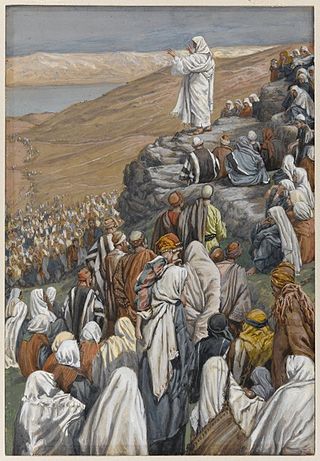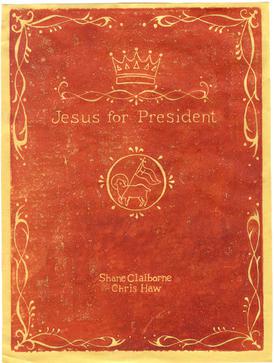To be born again, or to experience the new birth, is a phrase, particularly in evangelicalism, that refers to a "spiritual rebirth", or a regeneration of the human spirit. In contrast to one's physical birth, being "born again" is distinctly and separately caused by the operation of the Holy Spirit, and it is not caused by baptism in water. It is a core doctrine of the denominations of the Anabaptist, Moravian, Methodist, Baptist, Plymouth Brethren and Pentecostal Churches along with all other evangelical Christian denominations. All of these Churches strongly believe Jesus's words in the Gospels: "You must be born again before you can see, or enter, the Kingdom of Heaven". Their doctrines also mandate that to be both "born again" and "saved", one must have a personal and intimate relationship with Jesus Christ.

Carl Ferdinand Howard Henry was an American evangelical Christian theologian who provided intellectual and institutional leadership to the neo-evangelical movement in the mid-to-late 20th century. He was ordained in 1942 after graduating from Northern Baptist Theological Seminary and went on to teach and lecture at various schools and publish and edit many works surrounding the neo-evangelical movement. His early book, The Uneasy Conscience of Modern Fundamentalism (1947), was influential in calling evangelicals to differentiate themselves from separatist fundamentalism and claim a role in influencing the wider American culture. He was involved in the creation of numerous major evangelical organizations that contributed to his influence in Neo-evangelicalism and lasting legacy, including the National Association of Evangelicals, Fuller Theological Seminary, Evangelical Theological Society, Christianity Today magazine, and the Institute for Advanced Christian Studies. The Carl F. H. Henry Institute for Evangelical Engagement at Southern Baptist Theological Seminary and the Carl F. H. Henry Center for Theological Understanding at Trinity International University seek to carry on his legacy. His ideas about Neo-evangelism are still debated to this day and his legacy continues to inspire change in American social and political culture.
The emerging church, sometimes wrongly equated with the "emergent movement" or "emergent conversation", is a Christian movement of the late 20th and early 21st century. Emerging churches can be found around the globe, predominantly in North America, Western Europe, Australia, New Zealand, and Africa. Members come from a number of Christian traditions. Some attend local independent churches or house churches while others worship in traditional Christian denominations. The emerging church favors the use of simple story and narrative. Members of the movement often place a high value on good works or social activism, including missional living. Proponents of the movement believe it transcends labels such as "conservative" and "liberal"; it is sometimes called a "conversation" to emphasize its developing and decentralized nature, its range of standpoints, and commitment to dialogue. Participants seek to live their faith in what they believe to be a "postmodern" society. Disillusionment with the organized and institutional church has led participants to support the deconstruction of modern Christian worship and evangelism, and the nature of modern Christian community.
Agnostic theism, agnostotheism, or agnostitheism is the philosophical view that encompasses both theism and agnosticism. An agnostic theist believes in the existence of one or more gods, but regards the basis of this proposition as unknown or inherently unknowable. The agnostic theist may also or alternatively be agnostic regarding the properties of the god or gods that they believe in.

Stanley Martin Hauerwas is an American theologian, ethicist, and public intellectual. Hauerwas originally taught at the University of Notre Dame before moving to Duke University. Hauerwas was a longtime professor at Duke, serving as the Gilbert T. Rowe Professor of Theological Ethics at Duke Divinity School with a joint appointment at the Duke University School of Law. In the fall of 2014, he also assumed a chair in theological ethics at the University of Aberdeen. Hauerwas is considered by many to be one of the world's most influential living theologians and was named "America's Best Theologian" by Time magazine in 2001. He was also the first American theologian to deliver the prestigious Gifford Lectures at the University of St. Andrews in Scotland in over forty years. His work is frequently read and debated by scholars in fields outside of religion or ethics, such as political philosophy, sociology, history, and literary theory. Hauerwas has achieved notability outside of academia as a public intellectual, even appearing on The Oprah Winfrey Show.

William Henry Willimon is a retired American theologian and bishop in the United Methodist Church who served the North Alabama Conference for eight years. He is Professor of the Practice of Christian Ministry and Director of the Doctor of Ministry program at Duke Divinity School. He is former Dean of the Chapel at Duke University and is considered by many as one of America's best-known and most influential preachers. A Pulpit & Pew Research on Pastoral Leadership survey determined that he was one of the two most frequently read writers by pastors in mainline Protestantism alongside the Roman Catholic writer Henri Nouwen. His books have sold over a million copies. He is also Editor-At-Large of The Christian Century. His 2019 memoir Accidental Preacher was released to wide acclaim, described by Justo L. Gonzalez as "An exceptional example of theology at its best."
Postliberal theology is a Christian theological movement that focuses on a narrative presentation of the Christian faith as regulative for the development of a coherent systematic theology. Thus, Christianity is an overarching story, with its own embedded culture, grammar, and practices, which can be understood only with reference to Christianity's own internal logic.
Helmut Richard Niebuhr is considered one of the most important Christian theological ethicists in 20th-century America, best known for his 1951 book Christ and Culture and his posthumously published book The Responsible Self. The younger brother of theologian Reinhold Niebuhr, Richard Niebuhr taught for several decades at the Yale Divinity School. Both brothers were, in their day, important figures in the neo-orthodox theological school within American Protestantism. His theology has been one of the main sources of postliberal theology, sometimes called the "Yale school". He influenced such figures as James Gustafson, Stanley Hauerwas, and Gordon Kaufman.
The Evangelical left is a Christian left movement in Evangelical Christianity that affirms conservative evangelical theology and are politically progressive. It is mainly based in the US, but is also found in Latin America.
In Protestant Christianity, the relationship between Law and Gospel—God's Law and the Gospel of Jesus Christ—is a major topic in Lutheran and Reformed theology. In these religious traditions, the distinction between the doctrines of Law, which demands obedience to God's ethical will, and Gospel, which promises the forgiveness of sins in light of the person and work of Jesus Christ, is critical. Ministers use it as a hermeneutical principle of biblical interpretation and as a guiding principle in homiletics and pastoral care. It involves the supersession of the Old Covenant by the New Covenant and Christian theology.

Christian ethics, also known as moral theology, is a multi-faceted ethical system. It is a virtue ethic, which focuses on building moral character, and a deontological ethic which emphasizes duty. It also incorporates natural law ethics, which is built on the belief that it is the very nature of humans – created in the image of God and capable of morality, cooperation, rationality, discernment and so on – that informs how life should be lived, and that awareness of sin does not require special revelation. Other aspects of Christian ethics, represented by movements such as the social Gospel and liberation theology, may be combined into a fourth area sometimes called prophetic ethics.

The theology of Martin Luther was instrumental in influencing the Protestant Reformation, specifically topics dealing with justification by faith, the relationship between the Law and Gospel, and various other theological ideas. Although Luther never wrote a systematic theology or a "summa" in the style of St. Thomas Aquinas, many of his ideas were systematized in the Lutheran Confessions.

Constantinianism is a religiopolitical ideology in Christian politics that epitomizes the unity of church and state, as opposed to separation of church and state. This view is modeled after an ideal Christendom, which arose during the reign of Constantine the Great.
Political theology is a term which has been used in discussion of the ways in which theological concepts or ways of thinking relate to politics. The term is often used to denote religious thought about political principled questions. Scholars such as Carl Schmitt, a prominent Nazi jurist and political theorist, who wrote extensively on how to effectively wield political power, used it to denote religious concepts that were secularized and thus became key political concepts. It has often been affiliated with Christianity, but since the 21st century, it has more recently been discussed with relation to other religions.
Christian atheism is a form of atheism that adopts the teachings, narratives, symbols, practices, or communities associated with Christianity without accepting the literal existence of God.
Christian agnosticism is a theological position drawing influences from Christianity as well as agnosticism. Christian agnostics hold that it is difficult or impossible to be sure of anything beyond the basic tenets of the Christian faith. They believe that God or a higher power might exist, that Jesus may have a special relationship with God, might in some way be divine, and that God might perhaps be worshipped. This belief system has deep roots in the early days of the Church.

Samuel Martin Bailey Wells is an English priest of the Church of England. Since 2012, he has been the vicar of St Martin-in-the-Fields in central London, and Visiting Professor of Christian Ethics at King’s College London. In 2018, he was installed as Honorary Canon Theologian of Guildford Cathedral.

Jesus for President: Politics for Ordinary Radicals is a 2008 book co-written by the evangelical authors Shane Claiborne and Chris Haw, two important figures in New Monasticism. The book asserts that the countercultural themes in the ministry of Jesus, such as those of self-denial, are ignored by American Christians because they have become accustomed to exercising Christian privilege and are unwilling to give it up.
Troels Engberg Pedersen is a Pauline theologian, author, and professor of New Testament exegesis at the University of Copenhagen in Denmark.

Brian Brock is an American theologian. He holds a Personal Chair in Christian Ethics at the School of Divinity, History, and Philosophy, University of Aberdeen.









